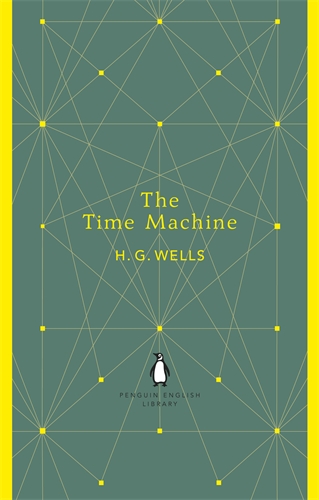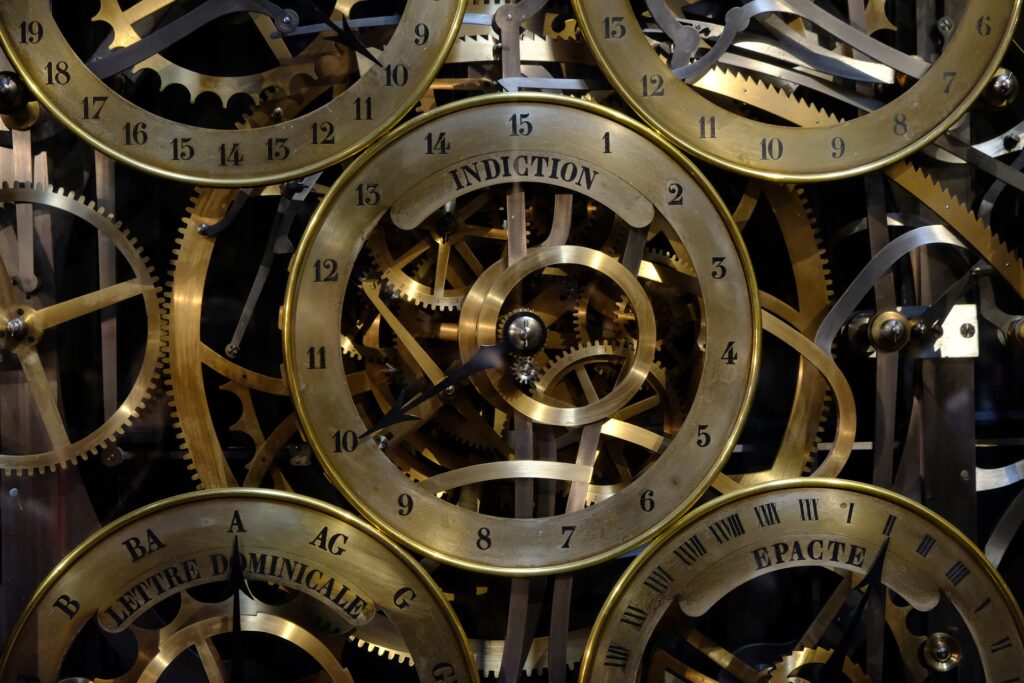
Author: H. G. Wells
Description: The classic time travel book. It features the iconic Eloi and Morlocks, two races from Earth’s future that are often referenced in pop culture.
Book length: Short
Rating: ⭐⭐⭐
It’s Time to Travel through Time
Marty, we have to go back! Nope, that’s not the one we are talking about today. The Time Machine by H. G. Wells is often recognized as THE time travel story. It’s not the first story to feature time travel, but it is the one which popularized the genre, serving as a kind of forefather to modern time travel stories.
When I hear the term time machine, I immediately think of the DeLorean from Back to the Future. It is just so iconic and a big part of pop culture. The brass machine with the big wheel at its rear from The Time Machine would probably be the second thing that comes to mind. The book was published in 1895, and has since been adapted into several feature films. The most recent one came out in 2002, starring Guy Pearce as the Time Traveler. The iconic machine was also featured in The Big Bang Theory, where it served as a major plot point in one of the episodes. It’s safe to say that even if you’re not a big sci-fi fan, chances are you’ve come across The Time Machine at some point, be it through TV, film, or collections of classic books.
Since I feel I have to talk about something that was a big drawback in this story for me, be prepared for some mild spoilers (only the general story structure).
Time Travel in Pop Culture
Let’s briefly talk time travel in general – there are countless books, movies and TV shows using time travel as a focal point in their narratives. Since The Time Machine, the genre expanded tremendously, and now includes many ‘types’ of time travel mechanisms. A lot of them are unique, and sometimes paradoxical, but generally, I like to put them into one of three categories:
1) One linear timeline – you go back and forth along one ‘Main’ Timeline. Changes you make in the past or future may affect your present. Example: Back to the Future.
2) Predestined – Your time travel is already accounted for, i.e. all your actions are suppose to happen. Your time traveling clone is already doing things you will do once you travel back in time. Example: Harry Potter and the Prisoner of Azkaban.
3) Branching timelines (Multiverse) – when you travel through time, you can’t change past events in your past timeline. You create alternate timelines starting from the point of intervention. Example: Primer.
The above may not be perfectly accurate, it’s just how I like to sort a time travel story in my head, so that I know what the author had in mind. Like I said, everyone has his own approach, and really there are no strict rules since it is, after all, science fiction. The plot of The Time Machine is not really centered around the time travel mechanisms per se, so I would not consider it a big spoiler to say that I would probably place it in some version of the first category.
A Strong Start
I am a big sci-fi fan, in particular I always enjoyed time travel stories. Since The Time Machine is THE time travel story, I was really looking forward to reading it. It also helps that the book is very short, so you don’t need much ‘mental preparation’ to get it started. The first chapter did not leave me disappointed, I think the start of the book worked really well. We get a scene where the Time Traveler explains the basic idea of time and time travel to a group of people from the British elite. It is simple, to the point, and provides enough context for moving along with the books’ idea.
Very soon we move on from a kind of introduction to the unfolding of the main story. Unfortunately, the rest of the book did not live up to the strong beginning in my opinion.

Cool Story Bro
Again I think it is not a huge spoiler to reveal how the story is presented, as it happens very early in the book. After the little talk they had at the beginning, the group arranges another meeting. Our Time Traveler arrives a bit late, seemingly exhausted and worn out. He reports that he managed to travel through time, was away for days, and was barely able to come back. He then proceeds to tell the whole story, under the condition that he may not be interrupted. This becomes the bulk of the book, we hear the whole story of his time traveling as he narrates it from that moment.
And exactly this was my biggest problem with the book. We hear the complete story, while knowing that the person who narrates it JUST came back from this time traveling adventure. He proceeds to seemingly talk for hours, describing insignificant details, the environment, how dark the dark is, etc… I mean that is all part of writing books, you enrich your story with details and try to convey some images and emotion. But when you deliberately choose that the character in your book describes all of this to other characters in the book, while knowing he JUST came back with a time machine?? I don’t know, this felt so off, I could not immerse myself in the story at all.
We are talking about time traveling here, and it goes without saying that in any kind of fiction we consume, there is bound to be some suspension of disbelief. But even then, a good piece of fiction should stay consistent within the rules it created and keep some logic. Here I could more easily accept that time travel exists, than that an actual time traveler who spent days away comes back to a group of his acquaintances, starts telling the complete story of his adventure in incredible detail like he is writing a novel of his own, and that no one ever really interrupts him with a question.
Maybe all that doesn’t sound like a big deal, but to me it was very distracting – I felt as if I asked you to show me the result summary of some study, and you first showed me 300 slides of data you gathered to complete the study, before showing me any kind of actual result. If you have just traveled through time, I’d like to hear some conclusions first, the details of how green the grass was can come later.
On top of all that, the story itself wasn’t really that interesting to me. There are some good parts, but altogether it left me with mixed feelings. There are way too many sentences that feel like filler, so even though the book is short, to me it felt kind of watered down.
My Reading Experience & Thoughts
As described above, most of the book felt kind of like a drag to me, I waited that the Time Traveler finishes his story so we can move on with the book, instead his telling the story is basically the whole book. Maybe it won’t bother you that much, but for me it really didn’t work. I think it would be much better if we as readers got to go through the events with the protagonist. It could have been the same exact story, but with a sense of ‘real time’, rather than hearing him tell the story to other characters. I feel like a third person perspective would work better in this case than the chosen first person perspective.
The iconic Eloi and Morlocks were not too interesting in my opinion. Perhaps they were meant to represent some class division in our society, and this topic could be further analyzed. For me, it just wasn’t as compelling, so I’ll leave it at that for the time being.
At the end there is another section which is no longer a part of the Time Traveler’s narrative, and that section was again really good in my opinion. Here I will not get into details, but we get a scene of the time traveling and I think it was written beautifully. It has the potential to nicely transfer the visual spectacle from written word to mind.
Although the book is short, it took me a few sessions to finish it, as I didn’t find it particularly interesting and engaging.
Conclusion & Verdict
The Time Machine is a classic piece of science fiction that paved the way to countless other time travel stories. For that alone, it deserves some credit. It has a strong opening and closing act, while the middle section can feel boring at times.
The time travel aspect could have been used a bit more in my opinion. The Elois and Morlocks did not provide enough in terms of characters to have me engaged in the story. I do acknowledge this may have been an artistic choice, with some social critique behind it. I really wanted to like the book, but ended up a bit of disappointed.
Overall, I think this is one of those instances where the really iconic parts of the book, like the time machine itself, and the Eloi and Morlocks, actually outgrew the quality of the complete work. One could still argue that those things are iconic precisely because the book itself is of high quality. That may be so. Still, I think it has some major drawbacks like story structure and the lack of any real 3-dimensional characters. I would not really recommend this one as a must read, unless you are a hard core sci-fi time travel fan. It is quite short, so maybe it’s still worth a try if you’re interested in the topic, you could end up really liking it.
The Penguin English Library edition of the book looks fantastic though!
Rating: 3/5
Pros
+ Popularized the time travel genre
+ Strong beginning and end
+ A short read
Cons
– The way the story was laid out
– Can feel like a drag, mid section not as strong as beginning and end
– Hardly any character development
Nice one 🙂